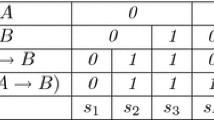Abstract
We present a novel approach to paraconsistent reasoning, that is, to reasoning from inconsistent information. The basic idea is the following. We transform an inconsistent theory into a consistent one by renaming all literals occurring in the theory. Then, we restore some of the original contents of the theory by introducing progressively formal equivalences linking the original literals to their renamings. This is done as long as consistency is preserved. The restoration of the original contents of the theory is done by appeal to default logic. The overall approach provides us with a family of paraconsistent consequence relations.
Our approach is semantical because it works at the level of the propositions; it deals with the semantical link between a proposition and its negation. The approach is therefore independent of the combination of the connectives that are actually applied to the propositions in order to form entire formulas.
Similar content being viewed by others
References
Anderson, A. and Belnap, N.: Entailment: The Logic of Relevance and Necessity Vol. I, Princeton University Press, 1975.
Arieli, O. and Avron, A.: Logical bilattices and inconsistent data, in Proc. Logic in Computer Science Conference, 1994, pp. 468–476.
Belnap, N.: A useful four-valued logic, in J. Dunn and G. Epstein (eds), Modern Uses of Multiple-Valued Logic, Reidel, 1977.
Benferhat, S., Dubois, D. and Prade, H.: Argumentative inference in uncertain and inconsistent knowledge bases, in Proc. Ninth International Conference on Uncertainty in Artificial Intelligence, 1993, pp. 411–419.
Besnard, P.: Paraconsistent logic approach to knowledge representation, in M. de Glas and D. Gabbay (eds), Proc. First World Conference on Fundamentals of Artificial Intelligence, 1991.
Blair, H. and Subrahmanian, V. S.: Paraconsistent foundations of logic programming, J. Non-Classical Logics 5(2) (1988), 45–73.
Blair, H. and Subrahmanian, V. S.: Paraconsistent logic programming, Theoretical Computer Science 68(2) (1989), 135–154.
Brass, S.: On the semantics of supernormal defaults, in Ruzena Bajcsy (ed.), Proc. International Joint Conference on Artificial Intelligence, Morgan Kaufmann Publishers, 1993, pp. 578–583.
Brewka, G.: Nonmonotonic Reasoning: Logical Foundations of Commonsense, Cambridge University Press, Cambridge, 1991.
Carnielli, W., Fariñas del Cerro, L. and Lima Marques, M.: Contextual negations and reasoning with contradictions, in J. Mylopoulos and R. Reiter (eds), Proc. International Joint Conference on Artificial Intelligence, Morgan Kaufmann Publishers, 1991, pp. 532–537.
da Costa, N.: On the theory of inconsistent formal systems, Notre Dame Journal of Formal Logic 15 (1974), 497–510.
Damásio, C. V. and Pereira, L. M.: A survey on paraconsistent semantics for extended logic programs and transformations for well-founded semantics, in D. Gabbay and P. Smets (eds), Handbook of Defeasible Reasoning and Uncertainty Management Systems Vol. 2, Oxford University Press, 1997, to appear.
Dix, J.: On cumulativity in default logic and its relation to Poole's approach, in B. Neumann (ed.), Proc. European Conference on Artificial Intelligence, John Wiley and Sons, 1992, pp. 289–293.
Gabbay, D. and Hunter, A.: Restricted access logics for inconsistent information, in M. Clarke, R. Kruse, and S. Moral (eds), Proc. European Conference on Symbolic and Quantitative Approaches to Reasoning and Uncertainty, Springer-Verlag, 1993.
Gallier, J.: Logic for Computer Science: Foundations of Automated Theorem Proving, Harper and Row, New York, 1986.
Grant, J. and Subrahmanian, V. S.: Reasoning in inconsistent knowledge bases, IEEE Transactions on Knowledge and Data Engineering 7(1) (1995), 177–189.
Horty, J., Thomason, R. and Touretzky, D.: A skeptical theory of inheritance in nonmonotonic semantic networks, Artificial Intelligence 42 (1990), 311–348.
Kifer, M. and Lozinskii, E.: RI: A logic for reasoning with inconsistency, in Proc. Logic in Computer Science Conference, 1989, pp. 253–262.
Makinson, D.: General theory of cumulative inference, in M. Reinfrank, J. de Kleer, M. Ginsberg, and E. Sandewall (eds), Proc. Second International Workshop on Non-Monotonic Reasoning Vol. 346 of Lecture Notes in Artificial Intelligence, Springer-Verlag, 1989, pp. 1–18.
Manor, R. and Rescher, N.: On inferences from inconsistent information, Theory and Decision 1 (1970), 179–219.
Murray, N.: Completely non-clausal theorem proving, Artificial Intelligence 18 (1982), 67–85.
Pequeno, T. and Buchsbaum, A.: The logic of epistemic inconsistency, In J. Allen, R. Fikes and E. Sandewall (eds), Proc. Second International Conference on the Principles of Knowledge Representation and Reasoning, Morgan Kaufmann Publishers, San Mateo, CA, 1991, pp. 453–560.
Poole, D.: A logical framework for default reasoning, Artificial Intelligence 36 (1988), 27–47.
Priest, G., Routley, R. and Norman, J.: Paraconsistent Logics, Philosophica Verlag, 1989.
Reiter, R.: A logic for default reasoning, Artificial Intelligence 13(1–2) (1980), 81–132.
Reiter, R.: A theory of diagnosis from first principles, Artificial Intelligence 32(1) (1987), 57–96.
Rescher, N. and Brandom, R.: The Logic of Inconsistency, Blackwell, 1980.
Roos, N.: A logic for reasoning with inconsistent knowledge, Artificial Intelligence 57 (1992), 69–103.
Sandewall, E.: A functional approach to non-monotonic logic, Computational Intelligence 1 (1985), 80–87.
Shoenfield, Joseph, R.: Mathematical Logic, Addison-Wesley, Reading, MA, 1967.
Wagner, G.: Ex contradictione nihil sequitur, in J. Mylopoulos and R. Reiter (eds), Proc. International Joint Conference on Artificial Intelligence, Morgan Kaufmann Publishers, 1991, pp. 538–543.
Author information
Authors and Affiliations
Rights and permissions
About this article
Cite this article
Besnard, P., Schaub, T. Signed Systems for Paraconsistent Reasoning. Journal of Automated Reasoning 20, 191–213 (1998). https://doi.org/10.1023/A:1005957026440
Issue Date:
DOI: https://doi.org/10.1023/A:1005957026440




